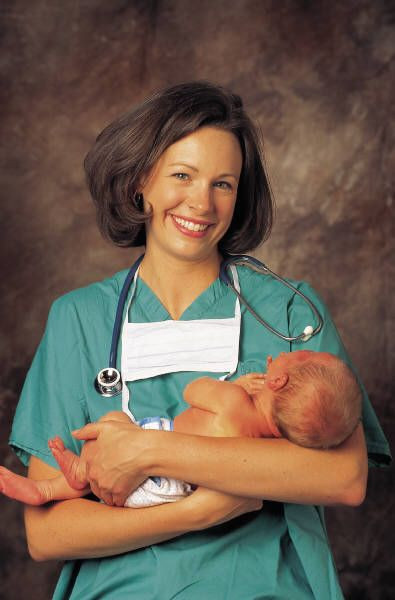Women In Medicine Feel The Ticking Of The Mommy Clock

For many in the Western world, the sun sets later on family life as women delay childbirth to pursue careers in medicine and other advanced fields — sometimes missing their day altogether.
In a commentary published Monday in Annals of Family Medicine, two American medicine women lament their postponement of pregnancy amid marriage and miscarriage, describing a litany of complications and consternations for those who desire both career and family.
"As many women pursuing medical careers have done, we put the dream of motherhood on the wait list," Drs. Lisa N. Miura and Rebecca S. Boxer wrote. "We waited for the prefect moment: a time when we were settled — training complete, career launched, financial stability attained. Only then did we allow ourselves to begin our families."
Any decline in fertility with age did not apply to them, for they were immune to failure, naturally selected for intelligence the first day of freshman biology and "graced with the full support of families, professors, and peers."
As the opportunity for family narrowed with time, the women, like so many others, recalculated their goals to adjust expectations, first lowering expectations for family size and then considering assisted reproductive techniques and even adoption. Failing that, family might be conjoined on an even more delayed schedule with the adoption of an older child, meeting already in progress.
"I almost lost my chance of having my own child," wrote Miura. "The years passed by more swiftly than I realized. At 38, my specialist's deflating words of 'infertility due to advanced maternal age' left me in disbelief... How could his words apply to me? The biological clock: I thought I could beat it. Why did I believe, as a physician, I was immune to infertility?"
Likewise, Boxer lamented her failure to reproduce at a much younger age — 32 — after two miscarriages. "A stillborn child does not happen to a physician! I had prenatal care! I don't drink or smoke! I have no chronic illnesses! When I work hard, success is always delivered," wrote Boxer.
The funereal dirges for missed opportunities and unborn children join a wailing heard throughout the country's female intelligentsia, as educated women continuously reassess and rejigger their life balance options. Women of advanced maternal age are far more likely to experience complications even after conception, with greater chances of delivering babies requiring neonatal admission, at 25.5 percent versus 16.8 percent among women ages 20-34, according to a recent study published in BJOG: An International Journal of Obstetrics and Gynaecology.
They are also more likely to deliver by caesarean section, with 54.5 percent undergoing the procedure.
Aside from indulging in a bit of naval-gazing, Miura and Boxer advocate for greater support of women doctors in the medical culture, similar to the struggles of women in other advanced professions. "Unfortunately, the culture of medical training can intensify the struggles of those who desire children," they wrote. "Both men and women in medicine should carefully consider how medical school, residences, and fellowships can impinging on family planning.
Women in medicine, they argue, should enjoy the option to work within time frames compatible with their fertility, without suffering the repercussions of the so-called "mommy track" of other professions. These issues would become paramount, they wrote, as women soon gain parity with men in the profession with a nearly one-to-one ratio in medical schools and residency programs.
Source: Miura LN, Boxer RS. Women In Medicine And The Ticking Clock. Annals Of Family Medicine. 2013.
Published by Medicaldaily.com



























